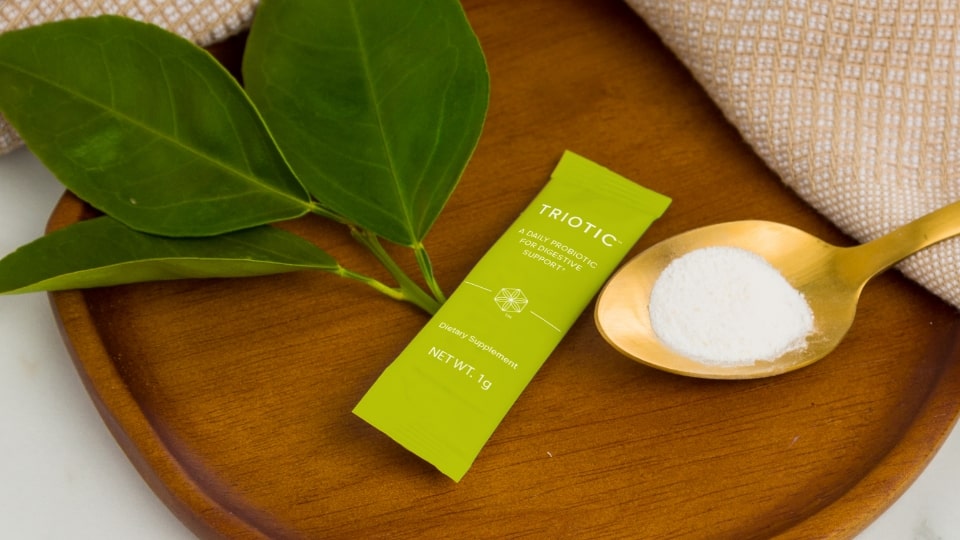A healthy digestive system helps you feel your best by supporting wellbeing from the inside out. Triotic™ supplies three clinically studied probiotic strains that provide daily support for gastrointestinal health, the immune system, and optimal wellness.
A Healthy Microbiome
Your digestive system is home to a complex community of microbes that make up your gut microbiome. These tiny microbes have an enormous influence on health, and scientific research reveals new, surprising ways that the gut microbiome can affect our wellbeing.
One of the most direct ways our gut microbiome influences health is through digestion. Your body digests and absorbs nutrients from the foods you eat, but there are substances in food your body cannot digest. When those leftover materials travel through your digestive system to your large intestine, they become fuel for the microbes in your gut. A healthy, balanced microbiome turns otherwise indigestible food components into beneficial substances. These include nutrients like vitamin K or bioactive metabolites such as short-chain fatty acids that promote the health of intestinal cells and wellbeing throughout the body (1).
Immunity might not be the first function that comes to mind when you think of the gastrointestinal tract, but the gut is considered the largest organ in the immune system (2). It plays a central role in regulating healthy, balanced immune function with the help of the gut microbiome. Interactions between the body’s network of immune cells and beneficial microbes in the intestine help to strengthen and focus the body’s overall immune defenses. A diverse and flourishing gut microbiome is linked to a strong, healthy immune system and a robust intestinal barrier. A depleted gut microbiome is associated with a weaker immune system and poor intestinal barrier function (2).
Power of Probiotics
Probiotics are living bacteria and other microbes that benefit health when consumed in sufficient amounts (3). When taken consistently, probiotics help to replenish and strengthen our gut microbiome and different probiotic strains contribute specific benefits to overall health.
We often think of fermented foods like yogurt, kombucha, or even kimchi when considering probiotics. These foods contain probiotic cultures that have been carefully selected to create delicious flavors and textures. Still, they do not offer the same potency, diversity, and strain-specific benefits of a quality probiotic supplement.
Triotic: Three Clinically-Tested Probiotics in One Daily Packet
Triotic is a fast-melting, natural fruit-flavored probiotic powder in convenient single-serving packets. Its gluten- and soy-free formula is easy to take and is ideal for adults and children ages 4 and up. Each serving contains 2.1 billion CFUs from a blend of three clinically studied probiotic strains to support a healthy digestive system, strong immune function, and whole-body wellness.
Bifidobacterium animalis ssp. lactis BIFOLAC™ 12: B. animalis is a species of beneficial bacteria that is naturally found in the gut of healthy people. Its subspecies, B. animalis ssp. lactis, is an especially beneficial member of a healthy gut microbiome. It’s among the best-studied probiotic strains and supports digestive wellbeing and immune health (4).
Lactobacillus acidophilus BIFOLAC™ 5: L. acidophilus is an extensively studied species of probiotic bacteria that has been linked to a wide array of health benefits including healthy immune function (5).
Lactobacillus rhamnosus BIFOLAC™ PB01: L. rhamnosus is a species of probiotic bacteria that is naturally present in the gut of healthy people and has been the subject of substantial scientific research. This probiotic species contributes to overall wellbeing and healthy immune function (6).
Triotic is the perfect microbiome boost for anyone ages 4 years and older. Simply pour Triotic powder directly onto your tongue and allow it to dissolve before swallowing. With its sweet fruity flavor, the benefits of Triotic’s three clinically studied probiotic strains are easy to enjoy.
References
- Debnath N, Kumar R, Kumar A, Mehta PK, Yadav AK. Gut-microbiota derived bioactive metabolites and their functions in host physiology. Biotechnol Genet Eng Rev. 2021;37(2):105-153. doi:10.1080/02648725.2021.1989847
- Takiishi T, Fenero CIM, Câmara NOS. Intestinal barrier and gut microbiota: Shaping our immune responses throughout life. Tissue Barriers. 2017 Oct 2;5(4):e1373208. doi: 10.1080/21688370.2017.1373208.
- Hill C, Guarner F, Reid G, et al. The International Scientific Association for Probiotics and Prebiotics consensus statement on the scope and appropriate use of the term probiotic. Nature Rev Gastroenterol & Hepatol. 2014 June 10; 11: 506-14.
- O’Callaghan A, van Sinderen D. Bifidobacteria and Their Role as Members of the Human Gut Microbiota. Front Microbiol. 2016;7:925. doi:10.3389/fmicb.2016.00925
- Walter J. Ecological role of lactobacilli in the gastrointestinal tract: implications for fundamental and biomedical research. Appl Environ Microbiol. 2008;74(16):4985-4996. doi:10.1128/AEM.00753-08
- van Baarlen P, Troost F, van der Meer C, et al. Human mucosal in vivo transcriptome responses to three lactobacilli indicate how probiotics may modulate human cellular pathways. Proc Natl Acad Sci U S A. 2011;108 Suppl 1(Suppl 1):4562-4569. doi:10.1073/pnas.1000079107





